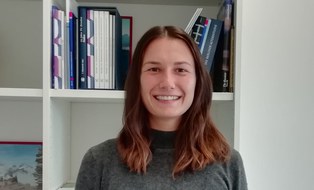Dr. Malin Hildebrandt
 © Malin Hildebrandt
© Malin Hildebrandt
Ph.D. Student
NameDr. Malin Hildebrandt M.Sc.
Send encrypted email via the SecureMail portal (for TUD external users only).
Dr. Malin Hildebrandt has been working at the chair of addiction research since October 2019. She studied psychology at the Ruprecht-Karls-University Heidelberg and the Technical University Dresden. During her PhD, she examined whether neural parameters (fMRI) could predict symptoms of substance use disorders among (poly-)substance users. Since 2020, she is doing psychotherapy training in behavioral therapy and has completed a formation in systemic therapy and coaching (Certification: Systemische Gesellschaft) during her studies. She is involved in teaching through classes in the Master’s degree Clinical Psychology and Psychotherapy as well as supervising Bachelor’s and Master’s theses.
Research interests:
- Substance use, in particular risk factors for consumption and the development of substance use related problems/symptoms
- Overlap of clinical psychology and neuroscience
- Biomarkers of psychological disorders and prediction of therapy success
- Applicability of imaging techniques for precision medicine
- Social affect and cognition
Publication:
Abrevaya, S., Fittipaldi, S., García, A. M., Dottori, M., Santamaria-Garcia, H., Birba, A., Yoris, A., Hildebrandt, M. K., Salamone, P., De la Fuente, A., Alarco-Martí, S., García-Cordero, I., Matorrel-Caro, M., Pautassi, R. M., Serrano, C., Sedeño, L., & Ibáñez, A. (2020). "At the heart of neurological dimensionality": Cross-Nosological and Multimodal Cardiac Interoceptive Deficits. Psychosomatic medicine, 82(9), 850–861.
Fittipaldi, S., Abrevaya, S., Fuente, A., Pascariello, G. O., Hesse, E., Birba, A., Salamone, P., Hildebrandt, M., Martí, S. A., Pautassi, R. M., Huepe, D., Martorell, M. M., Yoris, A., Roca, M., García, A. M., Sedeño, L., & Ibáñez, A. (2020). "A multidimensional and multi-feature framework for cardiac interoception." NeuroImage, 212, 116677.
Hildebrandt, M. K., Dieterich, R., & Endrass, T. (2021a). Disentangling substance use and related problems: urgency predicts substance-related problems beyond the degree of use. BMC Psychiatry, 21(1), 242. https://doi.org/10.1186/s12888-021-03240-z
Hildebrandt, M. K., Dieterich, R., & Endrass, T. (2021). Neural correlates of inhibitory control in relation to the degree of substance use and substance-related problems – A systematic review and perspective. Neuroscience & Biobehavioral Reviews, 128, 1-11. https://doi.org/https://doi.org/10.1016/j.neubiorev.2021.06.011
Hildebrandt, M. K., Jauk, E., Lehmann, K., Maliske, L., & Kanske, P. (2021). Brain activation during social cognition predicts everyday perspective-taking: A combined fMRI and ecological momentary assessment study of the social brain. NeuroImage, 227, 117624. https://doi.org/https://doi.org/10.1016/j.neuroimage.2020.117624
Hildebrandt, M. K., Koch, S. C., & Fuchs, T. (2016). "We Dance and Find Each Other": Effects of Dance/Movement Therapy on Negative Symptoms in Autism Spectrum Disorder. Behavioral sciences (Basel, Switzerland), 6(4), 24.
Researchgate Link
